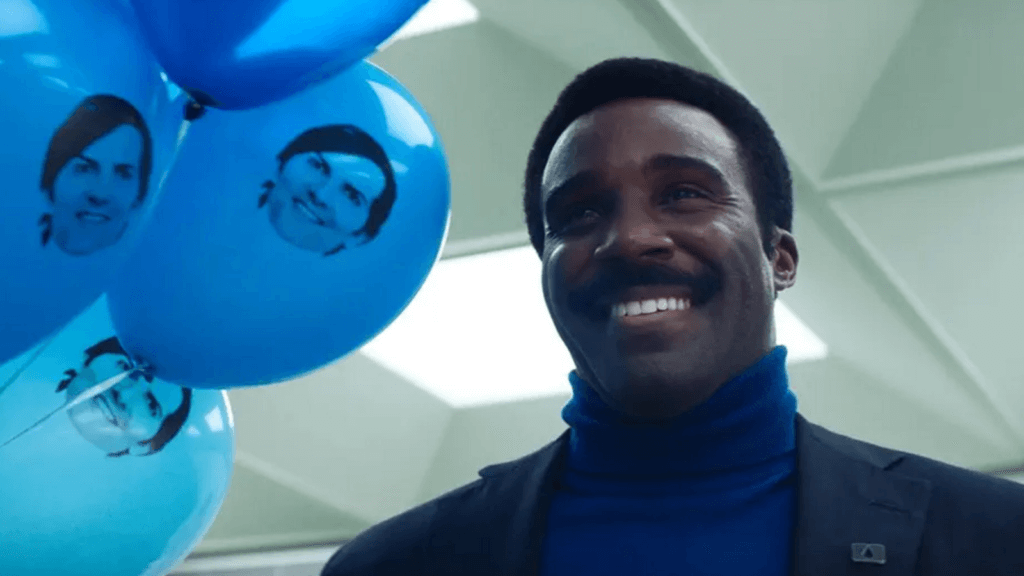
Severance Gets Lost in Season 2
By Brian Eggert | January 10, 2025
Note: Season 2 of AppleTV+’s Severance will debut on Friday, January 17, 2025.
Over the years, I’ve been burned by so many television shows that were canceled or ended badly. Battlestar Galactica, Deadwood, Dexter, Game of Thrones, Santa Clarita Diet, The Walking Dead, The X-Files, and above all others, Lost—they all started well but went astray after a few years. Apart from a few exceptions, I’ve stopped watching new shows until they’ve ended on their terms, and moreover, the fanbase generally agrees that the series ended well. Maybe this comes from a lifetime of watching movies, which have programmed me to expect a conclusion to the story. But at some point in my adulthood, I resolved that life’s too short to spend countless hours watching several seasons of a show only for the thing to peter out or for some executive to cancel the series.
Severance, the AppleTV+ series that debuted in 2022 and became an instant sensation, returns for its second season and shows signs of becoming another Lost in all the wrong ways. Over six seasons, Lost crumbled under the weight of its increasingly convoluted mythology and need to perpetuate a mystery, achieved by piling on more characters and plotlines, few of which earned worthwhile closure. Severance creator Dan Erickson is setting up a similar problem. With the first season having raised more questions than any show can satisfactorily answer, the second season finds Erickson caught in the same patterns created by Lost showrunners Damon Lindelof and Carlton Cuse.
Informed by Charlie Kaufman-level surrealism, a Gilliamesque portrait of corporate culture, and a split-mind concept straight out of Philip K. Dick’s A Scanner Darkly, all with hints of Mike Judge’s Office Space and the Wachowskis’ The Matrix, the boldly Marxist Severance centers around the mysterious Lumon Industries and its workforce.
Some Lumon workers have agreed to become “severed”—partly as a security measure, partly as an extreme solution to work-life balance, and partly for some unknown and presumably conspiratorial purpose. A microchip is implanted in the brains of employees who work on certain levels of the Lumon corporate office. Once these workers pass through a threshold to the “severed” floors, the brain implants separate their minds, keeping their work and personal lives distinct. Their “Innie” is their work personality, and their “Outie” is their original personality that interacts with the outside world. No knowledge passes between the two halves, and one’s Innie shares none of their Outie’s memories. For all intents and purposes, the two halves represent two individuals inside the same body at different parts of the day. Except, for the Innies, it feels like they’re always trapped at work.
Inside Lumon, the Macrodata Refinement department toils away, isolating obscure numbers on retro-futurist computers—though, they don’t understand what their work signifies. Department head Mark (Adam Scott) oversees the sarcastic Dylan (Zach Cherry), the devoted Lumoneer Irving (John Turturro), and rebellious newcomer Helly (Britt Lower). Severance’s first season culminated with a revelation from which there seemed to be no going back. Mark and the other Innies in his department found a way to put their minds into their Outies’ bodies, albeit temporarily, giving them a glimpse of who they really are, which, until then, was a mystery.

The finale’s reveals were shocking and devastating, and season one was generally outstanding. But the second season opens with several episodes justifying why the team should get back to work at Lumon despite learning so many troubling details about the company and their Outies. Few of their choices feel emotionally true. Then again, the writers have an imperfect record of allowing characters to deal with major story information adequately. Remember in season one, when Mark’s Outie saw a Lumon security employee bashed to death with a metal baseball bat? It was traumatizing enough to make him puke. But, like a lot of details, it was barely unpacked by the writers, thus the characters.
Darker and even more complex, season two deploys a jumbled, nonchronological structure for many of its episodes. The story hops between the months after the events in season one, establishing elaborate reasons why both Innies and Outies resolve to stay employed at Lumon. The episodes play temporal games, flashing back to witness the characters’ choices immediately after their rebellion or forward to after they’ve already returned. It’s a tactic similar to Lost’s blend of flashbacks and flashforwards. More than one episode dabbles in impressionistic editing and head-scrambling imagery to convey a fractured mind, recalling a similar technique to the subconscious-fuelled moments of Eternal Sunshine of the Spotless Mind. But where Severance’s season one had straightforward linearity, the messy structure of season two kept me at a remove.
For the first few episodes of season two, Erickson seems intent on keeping his main characters at Lumon, not because it makes sense for them, but because the weirdness inside the antiseptic white corridors of Lumon’s office space is the show’s distinguishing imagery. Then again, perhaps some of season two is about the rationalizations we make to justify staying at a shitty job, even though we know we should have quit a long time ago.
Now reporting directly to Milchick (Tramell Tillman)—the grinning member of middle management who has a new assistant in the form of a preadolescent girl (Sarah Bock)—our protagonists return to a corporate environment that claims “Lumon is listening” to their complaints and will improve. Supposedly, they’re no longer under constant surveillance and can access other perks. The oppressive banality of Lumon workspaces has been slightly updated, making the visual work of Ben Stiller (who directed five of season two’s ten episodes) and the other directors less distinct. Much of the season’s second half takes place outside of Lumon and adopts an atypical look for the series, distracting from many of the nagging questions introduced in season one; rather, it adds to the heap.
“Every secret hides a darker truth,” the season two promo trailer confirms. This is another way of admitting that every episode answers one small question while raising several more. Sure, it’s addictive to watch, since each answer delivers a brain-buzz reward, and every new question promises more habit-forming rewards in the future. But it also drives a snowball effect the showrunners cannot possibly keep up with.

The second season of Severance left me with a sense of déjà vu, thinking about how, just as with Lost, the show is fuelled by questions whose answers will undoubtedly be less interesting than the speculation they inspire: What does Lumon do? What does Macrodata Refinement mean? What’s at the end of the black hallway? What happened to Gemma? What is Irving’s Outie up to? What was happening at the waffle party? Does Lumon own stock in melons? And what about that department that raises baby goats—will it become another Lost-style polar bear, a detail that works better as an obscure mystery than an explanation?
Season two’s intense finale answers some of these questions, and not all are sufficiently creative reveals. Worse, they arrive after several aimless later episodes that neutralize the season’s overall momentum.
The problem with the puzzlework in Severance is that one expects the pieces to come together and form a cohesive picture. Lost never did, at least not in a way that proved satisfying for many viewers, myself included. But it was a fun ride, for a while anyway. And like Lost, Severance remains so watchable because the material has a distinct mythology, compelling characters, and thematic heft. Plus, it’s fascinating to learn more about this alternate reality where Kier Eagan, Lumon’s almighty founder, has an entrenched presence in American society dating back to the nineteenth century. Heading a mysterious capitalist enterprise and pseudo-religious philosophy, he might be an amalgam of Joseph Smith, L. Ron Hubbard, and the dystopian corporate mastermind in BioShock.
In its first season, Severance achieved something exceptional—a compelling, thoughtful, hilarious, and inspired television show with unforgettable imagery, including a wonderfully bizarre and award-winning title sequence (a less uncanny version has replaced it in season two). Even while the show continues to ask questions about the roles social learning, memory, and experience play in shaping our identities—universal questions that make the material relatable—season two muddies the waters, telling a story that, in some ways, is richer and more complex. But it’s also dour, completely abandoning the eccentric humor of the first season to meander about to its detriment.
Will Severance continue to follow Lost’s trajectory, where each new season arrives with diminishing quality until the novelty wears off completely? For millions of viewers, Lost was part of the great communal experience of prestige television, where talking about last night’s episode at work the next day was just as fun as watching the show. In that sense, Severance is worthwhile, and many will love talking about the second season.
Still, when I think about the hours I spent on Lost, which ultimately became a rambling experience with a frustrating conclusion, I cannot help but feel cynical about where Severance is headed. Does Erickson have a master plan? By the end of season two, it felt like he was making everything up as he went along, leaving the writers backed into an impossible corner and viewers poised for disappointment.
Thank You for Supporting Independent Film Criticism
If the work on DFR has added something meaningful to your love of movies, please consider supporting it.
Here are a few ways to show your support: make a one-time donation, join DFR’s Patreon for access to exclusive writing, or show your support in other ways.
Your contribution helps keep this site running independently. However you choose to support the site, please know that it’s appreciated.
Thank you for reading, and for making this work possible.
Brian Eggert | Critic, Founder
Deep Focus Review




